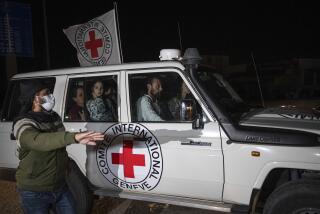Officials clash over numbers in Baghdad mass kidnapping
BAGHDAD — A day after a mass kidnapping in the capital, Shiite and Sunni Arab government officials Wednesday bickered over the actual number of men still missing.
Iraqi Prime Minister Nouri Maliki, a Shiite, said that all but two of 39 people abducted Tuesday by heavily armed men wearing police uniforms had been released. Sunni officials, including the minister in charge of the Higher Education Ministry building where the raid took place, said that as many as 150 were kidnapped and that 70 remained missing.
Higher education officials criticized Maliki’s insistence that the kidnappers were not real police commandos and his reluctance to blame Shiite militias, some of whom have infiltrated the force and carried out death-squad killings and kidnappings. The ministry is run by Sunnis.
At a news conference at the University of Baghdad, Maliki emphasized the effectiveness of the government’s response and pledged to punish those behind the raid at the Scholarship and Cultural Relations Directorate. Five Iraqi security officials, including the police chief and an army general in charge of the Karada district where the raid occurred, were in custody Wednesday.
But Abed Dhiyab Ajili, a Sunni Arab politician who is minister of higher education and scientific research, said Wednesday that 150 men had been abducted and that he was suspending his leadership of Iraq’s 200 universities and research centers until the last hostage was freed.
Ministry spokesman Basil Ismael Khateeb said that the number of released captives proved that estimates by Maliki’s office were too low, and that initial reports of more than 100 abductees were more accurate.
Khateeb said ministry officials arrived at that figure by counting the number of men who work at the building on a daily basis, interviewing released hostages and witnesses, and estimating the number of visitors who might have been there at the time of the raid.
Even by the government’s estimate, the mass kidnapping would be among the largest in a battle zone where ransom demands are common. Sunni insurgents as well as Shiite paramilitary groups engage in kidnappings to intimidate opponents. Mafia-style ransom networks also abduct people with impunity.
Kidnappings by men in police uniforms, however, raise the specter of militia death-squad operations that have produced a steady flow of mutilated corpses, many of them Sunnis.
Khateeb said hotlines set up after the raid had been swamped by relatives searching for loved ones, and ministry fears were compounded by the discovery of the bodies of 55 unidentified people in the capital. By Wednesday night, however, none of those had been linked to the mass kidnapping.
“I’m very afraid that some of the kidnapped people will be among those bodies,” Dr. Ala Maki, a Sunni Arab parliament member, said earlier in the day. “If that is the case, we will be in a very critical situation that will put the government and the Interior Ministry and Defense Ministry and the power of the state into question: What are their real intentions? Is this a real government? Or is there no government at all?”
In his comments at the University of Baghdad, the prime minister took pains to condemn the kidnappers and to praise his government’s reaction to the assault.
“The government has shown a strong response in chasing the ignorant and undisciplined criminals who have joined hands with Satan. By doing this, these criminals proved themselves to be worse than the takfiris,” Maliki said, using a term for extremists.
“We will never tolerate anyone who would dare to harm an Iraqi’s dignity, especially professors and students in particular, who have regrettably become targets of assassination and intimidation.”
Although the prime minister did not accuse Shiite militias of being behind the kidnappings, he suggested that the abductions were motivated by sectarianism when he announced an order banning “sectarian and ethnic activities” inside educational institutions.
Ministries in Iraq’s coalition government are divided among various Muslim sects and ethnic groups.
Maliki’s response to Tuesday’s attack does appear to be more robust than those to previous mass kidnappings.
But Maki said Maliki was exaggerating the effectiveness of the government’s response by insisting that all but two abductees had been released.
“They say they have been conducting operations against the kidnappers, but the government is avoiding even saying that the criminals are militia, that they are inside the police,” said Maki, a medical school professor who is also the chairman of the legislature’s higher education committee.
The attack was the latest in a series of blows to Iraq’s academic community. Education officials estimate that 150 to 300 university professors have been killed since the 2003 U.S.-led invasion and that thousands more educators have fled death threats and violence.
Khateeb said another academic was kidnapped Wednesday near his home in Adhamiya, a Sunni neighborhood in north Baghdad.
This month, gunmen killed the Shiite dean of the University of Baghdad’s college of administration and economy, along with his son and wife.
A few days before that, geologist Issam Rawi, a prominent Sunni leader and chair of Iraq’s University Professors Union, was slain.
“Unfortunately, the professors who are being killed and threatened are the most experienced and senior professors,” said Suha Azzawi, a political science professor at the University of Baghdad.
“We need their leadership. I was just speaking with one of my old professors and he told me he was leaving for Egypt. He said: ‘I can’t take it anymore -- all this killing and shooting. I cannot wait in my house for these criminals to murder me.’ ”
*
moore1@latimes.com
More to Read
Sign up for Essential California
The most important California stories and recommendations in your inbox every morning.
You may occasionally receive promotional content from the Los Angeles Times.










